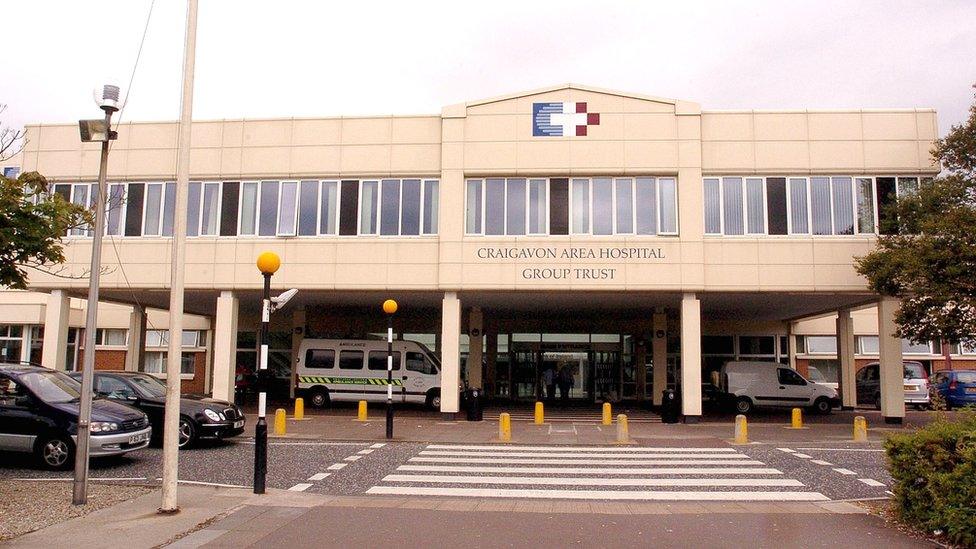Urology inquiry: Department of Health to review early alert system
- Published

Urology consultant Aidan O'Brien worked at Craigavon Area Hospital before his retirement in July 2020
The Department of Health (DoH) is to review its "early alert" system because it's not working consistently, a public inquiry has been told.
The review was revealed during evidence to the inquiry examining consultant urologist Dr Aidan O'Brien's work.
It is also examining the Southern Health and Social Care Trust's handling of urology services before May 2020.
The inquiry heard the DoH did not know about the urology problems until the end of July 2020.
The department's permanent secretary Peter May said the "early alert" system - which allows information of concern to reach the department - needed to be clearly understood.
"There's always going to be a risk that something doesn't come forward because people don't feel it does meet the terms or perhaps is not recognised for the significance that it has when it appears," he said.
"So, I think anyone sitting here would be foolish to say that they have absolute confidence in a system of that nature.
"It's all down to human judgement and prone to human error in relation to how systems of that nature work."
He also admitted that there were shortcomings in the current system, saying: "I think we're not clear at the moment that the policy is being implemented consistently."
Explaining that the early alert system was to be reviewed, in the absence of a minister, he said: "What we're trying to do is to make an existing policy work properly, as it were, rather than create a new policy."
He said the aim of the review was to make sure the guidance is well understood.
Earlier, Mr May apologised to families and patients linked to the public inquiry.
At the beginning of Tuesday's hearing, Mr May acknowledged the "concerns, distress and anxiety" caused by a previous review into urology services and by the current public inquiry.
He said the inquiry was one of a number of inquiries that had raised "serious concerns" about patient safety issues and the health services must learn, from all of them, ways to improve "how these vital services are delivered".
The inquiry previously held hearings with patients and families, in private, to learn first-hand about their experiences with the Southern Health and Social Care Trust (SHSCT).
Hundreds of families have been affected and over a thousand patients' records were recalled as a result of a review into Mr O'Brien's work.

Aidan O'Brien worked at the Southern Health Trust from 1992 until his retirement in July 2020
The first week of the inquiry heard opening statements from the legal representatives of each core participant which includes the DoH, SHSCT and Mr Aidan O'Brien.
From Tuesday, the inquiry will hear from other non-patient and family witnesses, beginning with Mr May, who became DoH permanent secretary earlier this year.
Previously, the inquiry heard that Mr O'Brien claimed the trust provided an "unsafe" service and was trying to shift blame on to its medics.
It has also been claimed that some private patients, under the care of Mr O'Brien, were given "advantageous" treatment over NHS patients with the same clinical priority.
The inquiry has already heard that Mr O'Brien rejected the suggestion that he had been "improperly advantaging" private patients.
Counsel for the inquiry, Martin Wolfe KC, also said during the opening week of the inquiry that it may have to consider which senior managers within the trust knew what and when.
A previous investigation found that there were "earlier opportunities" where those within the health trust could have added concern about Mr O'Brien's work prior to 2016.
Last week, the inquiry also heard that Mr O'Brien had left a 6.5cm swab in a patient after surgery and failed to identify it in a scan three months later.
The opening week of the inquiry was also told that almost 600 patients received "sub-optimal care" from Mr O'Brien's clinical practice.
Related topics
- Published10 November 2022

- Published9 November 2022

- Published26 October 2020
